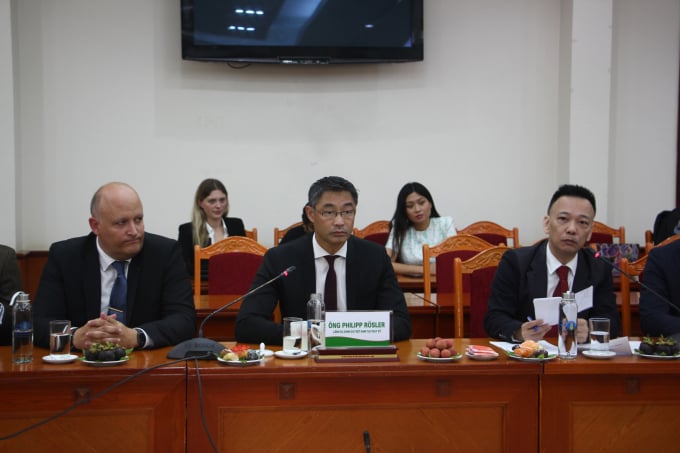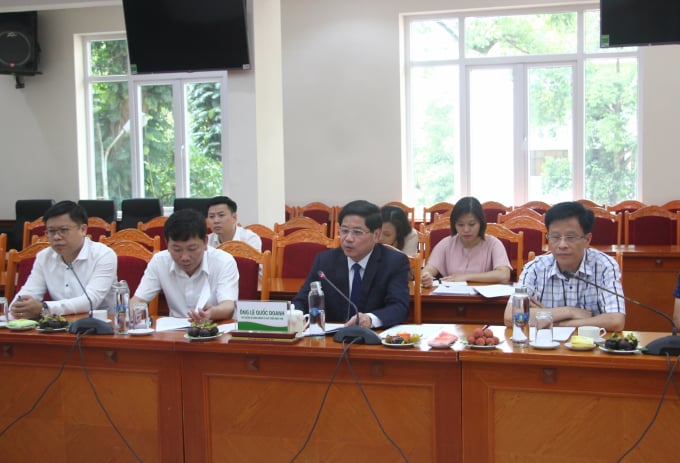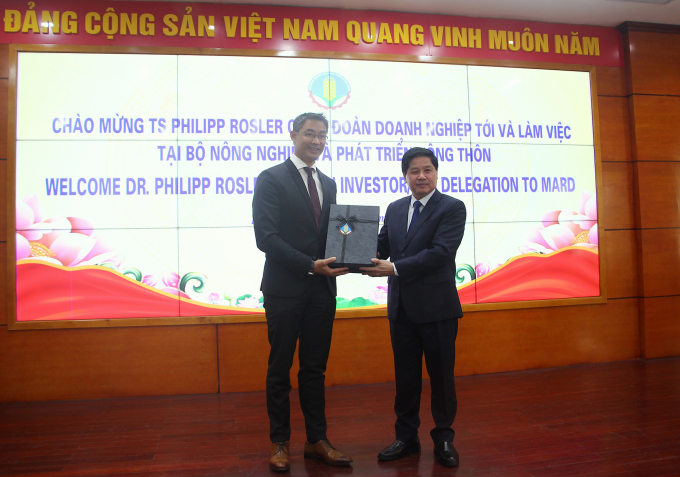June 21, 2025 | 02:20 GMT +7
June 21, 2025 | 02:20 GMT +7
Hotline: 0913.378.918
June 21, 2025 | 02:20 GMT +7
Hotline: 0913.378.918
On June 28, the Ministry of Agriculture and Rural Development welcome Dr. Philipp Rosler, the first Honorary Consul of Vietnam in Switzerland, and had a working session with representatives of 22 Swiss and German businesses, investment funds and start-up funds.
Deputy Minister of Agriculture and Rural Development Le Quoc Doanh said that this was a good opportunity for all parties to exchange and learn about agricultural development cooperation in Vietnam.
Vietnam is becoming an important partner not only for Switzerland and Germany but also for member countries of the European Union (EU). Particularly in the field of agroproduction and food processing, Dr. Philipp Rosler said that the Swiss and German delegations expressed interest in two content: producing and exporting agro-products from Vietnam to other countries in the world, and ensuring sustainable agricultural development.

Dr. Philipp Rosler (middle), Vietnam's first Honorary Consul in Switzerland. Photo: Linh Linh.
And to matters related to sustainable development specifically sustainable food production, applying technology as well as innovation reform strategies is inevitable. Dr. Rosler wished to receive information from the Ministry of Agriculture and Rural Development about preferential and supportive policies for Swiss and German businesses having the intention to invest technology and digitization in Vietnam's aquaculture sector.
Responding to the Swiss and German business delegations, the leaders of the Ministry of Agriculture and Rural Development said that every year Vietnam exported from 6 to 6.5 million tons of rice with an export value of over USD 3 billion. Nearly 90% of exported rice is of high quality. In the context that the world food system is facing challenges from natural disasters, epidemics and conflicts, Vietnam saw an opportunity to expand its export market.
“Recently the agriculture sector has paid attention to instructing farmers in advanced techniques, improving productivity, reducing input costs, bringing economic benefits, and reducing the impact of the production process on the environment," said Deputy Minister Le Quoc Doanh.

Deputy Minister of Agriculture and Rural Development Le Quoc Doanh said that Vietnam’s agriculture required support in terms of advanced technology and equipment for sustainable and environmentally-friendly development. Photo: Linh Linh.
The Ministry of Agriculture and Rural Development is also interested in cooperating with international organizations and foreign businesses to build advanced farming models and develop value chains for rice seeds, inputs, deep processing, product diversification, logistics and distribution. Enterprises investing in Vietnam’s agricultural sector enjoy many tax incentives such as corporate income tax reduction and land tax reduction.
“Productivity is one thing, but the rice industry needs to reduce input costs and at the same time change farmers' habit of using fertilizers and pesticides excessively. We therefore need the cooperation of businesses to access advanced technologies in order to overcome these shortcomings,” said Deputy Minister Le Quoc Doanh.

Deputy Minister Le Quoc Doanh presented gifts to Dr. Philipp Rosler. Photo: Linh Linh.
According to the Ministry of Agriculture and Rural Development, the fishery sector encourages investment for development in the direction of improving quality, value and sustainability. Aquaculture is being developed in the organic direction. The fishery base system is increasing advanced. Technology and equipment are fully utilized in the stages of preliminary processing, preservation, cold storage to ensure the quality of raw materials and meet the needs of the market.
Representatives of the Swiss and German business delegations highly regarded the achievements of Vietnam’s aquaculture as well as the impressive number of exports that Vietnam has achieved in the past year. However, in consideration of the current growth momentum, foreign businesses argued that Vietnam had not yet paid enough attention to factors such as abuse of antibiotics in aquaculture and impacts on the environment. This made the quality of fishery products unable to satisfy the requirements when exporting to the EU.
Responding to the comments of the working delegation, Mr. Nguyen Nhu Tiep, Director of the National Agro-Forestry-Fisheries Quality Assurance Department (Nafiqad), said that the Ministry of Agriculture and Rural Development had been implementing methods to raise awareness of farmers and improve management from distribution and use of antibiotics to reduce input costs and lower the risk of antibiotic residues. “The cooperation with Swiss and German businesses to transfer green technologies will help Vietnam's seafood industry improve and develop more sustainably.”
Translated by Samuel Pham
![Turning wind and rain into action: [9] Digitizing hydrometeorological data in response to climate change](https://t.ex-cdn.com/nongnghiepmoitruong.vn/608w/files/news/2025/06/17/z6704423696987_15fd32ffc26d590d204d520c9dac6786-nongnghiep-165943.jpg)
(VAN) Farmers have begun accessing hydrometeorological applications to adjust their cropping schedules, aiming to ensure productivity and adapt to climate change.
![Turning wind and rain into action: [8] Real-time salinity detection and early warning technology](https://t.ex-cdn.com/nongnghiepmoitruong.vn/608w/files/news/2025/06/17/z6704423696987_15fd32ffc26d590d204d520c9dac6786-nongnghiep-151127.jpg)
(VAN) Thanks to the integration of modern hydrological-hydraulic models, remote sensing technologies, and artificial intelligence, the accuracy of hydrological forecasting has significantly improved.
![Turning wind and rain into action: [7] Early disaster warnings help marine farmers minimize losses](https://t.ex-cdn.com/nongnghiepmoitruong.vn/608w/files/news/2025/06/17/z6704423696987_15fd32ffc26d590d204d520c9dac6786-nongnghiep-142942.jpg)
(VAN) In recent years, thanks to early disaster warnings and forecasting, marine farmers in Khanh Hoa province have been able to reduce risks and losses, thereby improving production efficiency.
![Turning wind and rain into action: [6] ‘Four on-the-spot’ disaster management software](https://t.ex-cdn.com/nongnghiepmoitruong.vn/608w/files/news/2025/06/17/e5a48259d6a262fc3bb3-nongnghiep-183800.jpg)
(VAN) By simply activating the scenario on the disaster management software, the relevant authorities immediately know how many households need to be evacuated, where to evacuate them to, and by what means of transportation…
![Turning wind and rain into action: [5] Hue applies modern technology in disaster forecasting](https://t.ex-cdn.com/nongnghiepmoitruong.vn/608w/files/news/2025/06/17/z6704423696987_15fd32ffc26d590d204d520c9dac6786-nongnghiep-093938.jpg)
(VAN) In Hue city, modern technology has recently been applied in meteorological and hydrological forecasting and warning, helping to reduce the damage caused by natural disasters.

(VAN) A cutting-edge farming technique being implemented on an experimental ranch in Arizona's Sonoran Desert has already saved a billion gallons of water over five years, according to Civil Eats.

(VAN) Poultry and pig production and the environment can be boosted through enhanced water technology, according to new research.